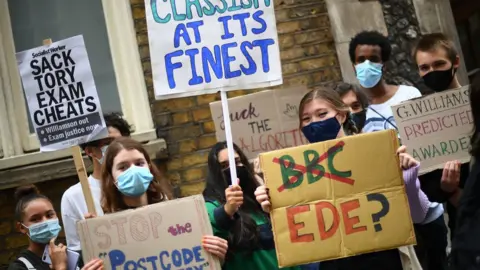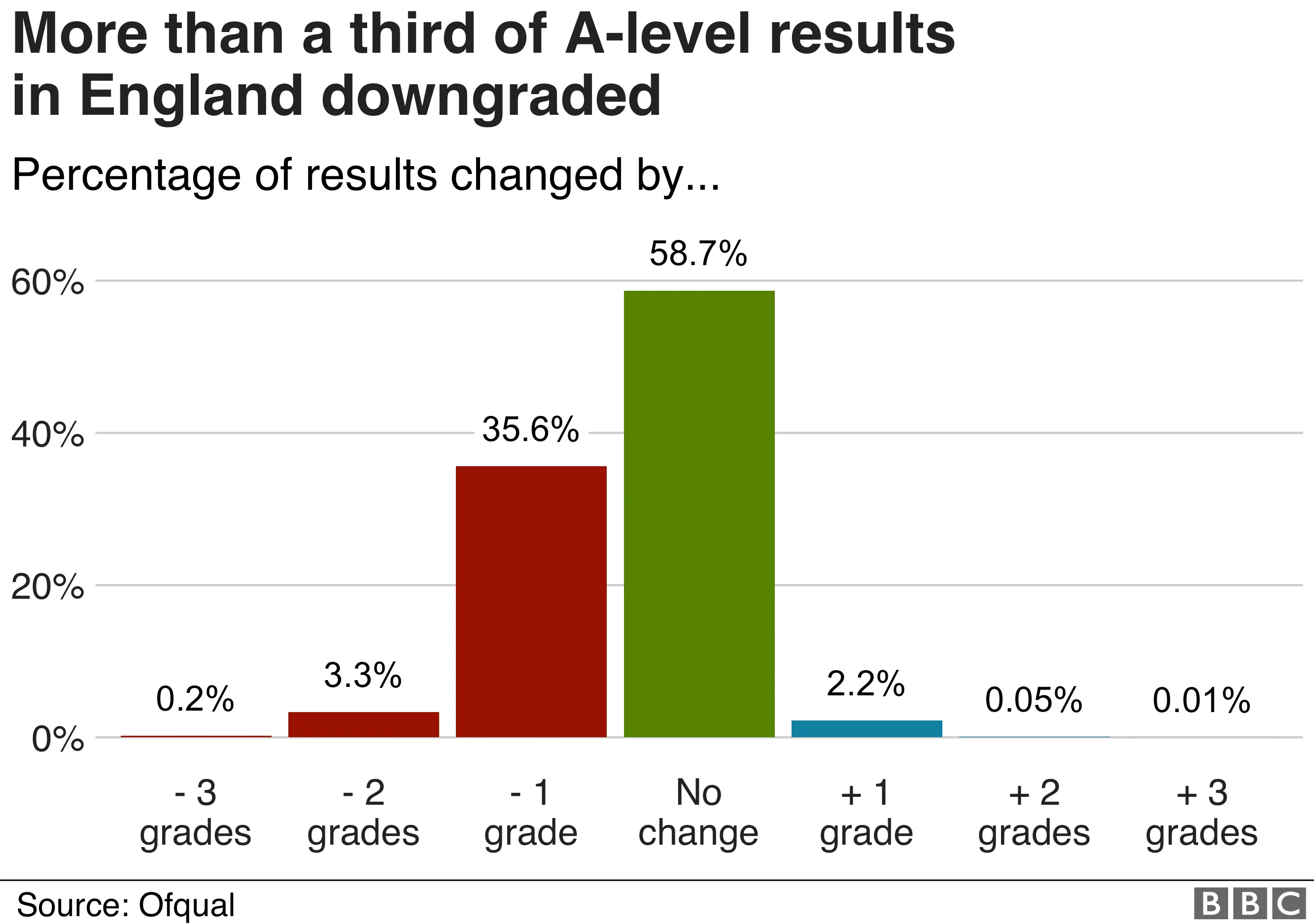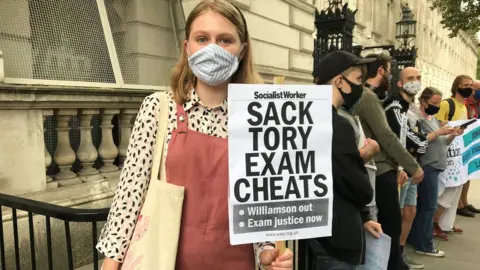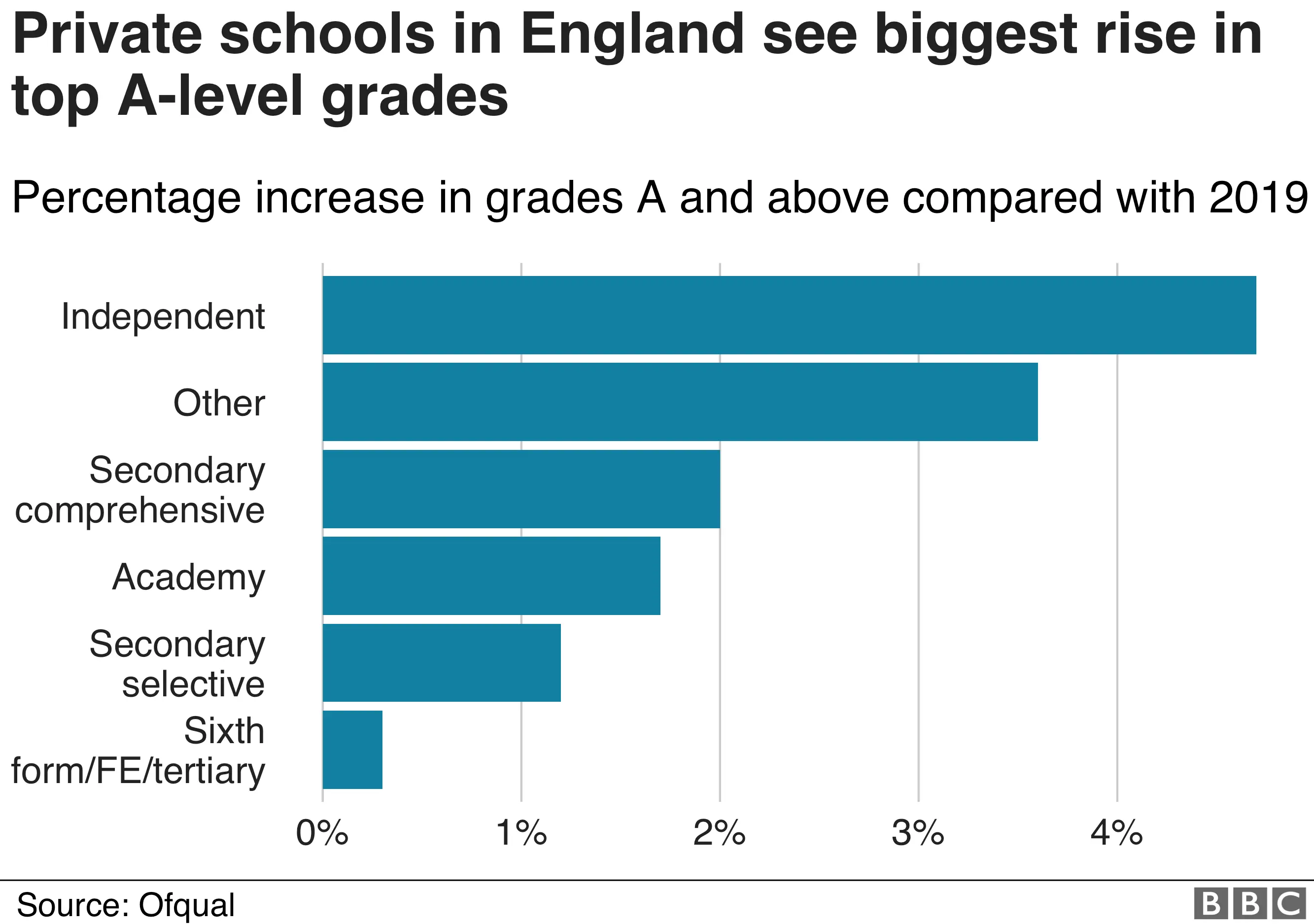A-levels and GCSEs: Student tells minister 'you've ruined my life'
A student rejected by her chosen university after her A-levels were downgraded has told schools minister Nick Gibb, "you've ruined my life".
Nina Bunting-Mitcham, speaking on the BBC's Any Questions, said her marks were three grades lower than predicted.
And talking to the BBC on Saturday, she said that getting three Ds had made her feel like life "was completely over".
The government says it will cover the cost of appeals after 280,000 grades in England were downgraded.
With school exams cancelled due to the coronavirus pandemic, this year's grades in England were awarded using a controversial modelling system, with the key factors being the ranking order of pupils and the previous exam results of schools and colleges.
In England, 36% of entries had grades lower than their teachers predicted and 3% were down two grades, prompting anger and distress among schools, colleges and students.
Nina told the BBC her teachers were "utterly shocked" on learning her predicted results of ABB - in biology, chemistry and psychology - had plummeted.
The pupil at New College, Stamford, confronted Nick Gibb on BBC Radio 4's Any Questions on Friday.
"It's got to be a mistake, I have never been a D-grade student," she told him.
"I feel my life has been completely ruined, I can't get into any universities with such grades or progress further in my life."
"You have ruined my life."
Responding to Nina, Mr Gibb said it was "rare" for students to be downgraded three grades, adding it "should not have happened".
"It won't ruin your life, it will be sorted, I can assure you."
He admitted to "imperfections somewhere in the system" and said challenged grades would be addressed "swiftly", by 7 September at the latest.
Ministers are expected to set up a taskforce, led by Mr Gibb, to oversee the appeals process.
 PA Media
PA MediaSpeaking to the BBC on Saturday, Nina said she felt "encouraged" by the minister's words, but believed his statement contradicted previous assurances by the government that the grading system was "robust".
She said she had begun the appeals process, but it was still not clear whether revised grades would be based on mock exams or teachers' predictions - and the Royal Veterinary College would only keep her place open until 31 August.
"They [the government] need to believe in the teachers," she said. "The teachers are professionals. They see students every day, they talk to them, they know them personally... They are the best people to predict the grades."


The Department of Education said it had introduced a "triple lock system", meaning those pupils "unhappy with their calculated grades can appeal on the basis of a valid mock result" or sit an exam in the autumn.
The government also said it would reimburse the cost of an appeal - which can reach £150 - to ensure that head teachers were not deterred from taking on harder to prove cases.
However, one head teacher told BBC Breakfast it was a "token gesture", adding that appeals were already free if they were successful.
 PA Media
PA MediaMeanwhile, Oxford's Worcester College said it would honour all offers it had made to UK students, irrespective of their A-level results.
Admissions tutor Prof Laura Ashe said it was "the morally right thing to do".
Because students had not taken any exams, "we took the view there wasn't going to be any new information that could justify rejecting someone to whom we'd made an offer", she said.
She said the algorithm used to adjust grades "literally copied the inequalities that are currently existing in our education system", with a quarter of the college's state school applicants being downgraded, but only 10% of private school candidates.
Ofqual adjusted the results to make the spread of grades look right at a national level, she said, but "they can't possibly tell us that they've given the right grades to the right people".
Greater Manchester Mayor Andy Burnham said he was "fully prepared to take legal action", arguing that Ofqual's grading system was "straightforwardly discriminatory" against working class and ethnic minority students who are more likely to attend large, urban sixth form colleges.
"It discriminates against young people on the basis of the institution that they went to, rather than their ability."
"I cannot stand by and see thousands of lives ruined across Greater Manchester," he told BBC Breakfast, calling the process "fundamentally unfair".
He accused the government of being "out of touch" and called the grading system "the single biggest act of levelling down that this country has ever seen".


There have been calls to move away from the system and use teachers' predictions - following a U-turn by the government in Scotland, where downgraded results have been replaced by the original teacher estimates.
But England's exam watchdog, Ofqual, has warned that using teachers' predictions would have artificially inflated results - and would have seen about 38% of entries getting A*s and As in England.
Education Secretary Gavin Williamson has vowed there will be "no U-turn" while insisting his "absolute priority is fairness".
Robert Halfon, the Conservative chairman of the Commons Education Committee, joined opposition parties in expressing concern over what Labour termed an "exams fiasco".
He called on Ofqual to publish details of the algorithm it used to make its calculations, adding: "If the model has penalised disadvantaged groups, this is very serious."
